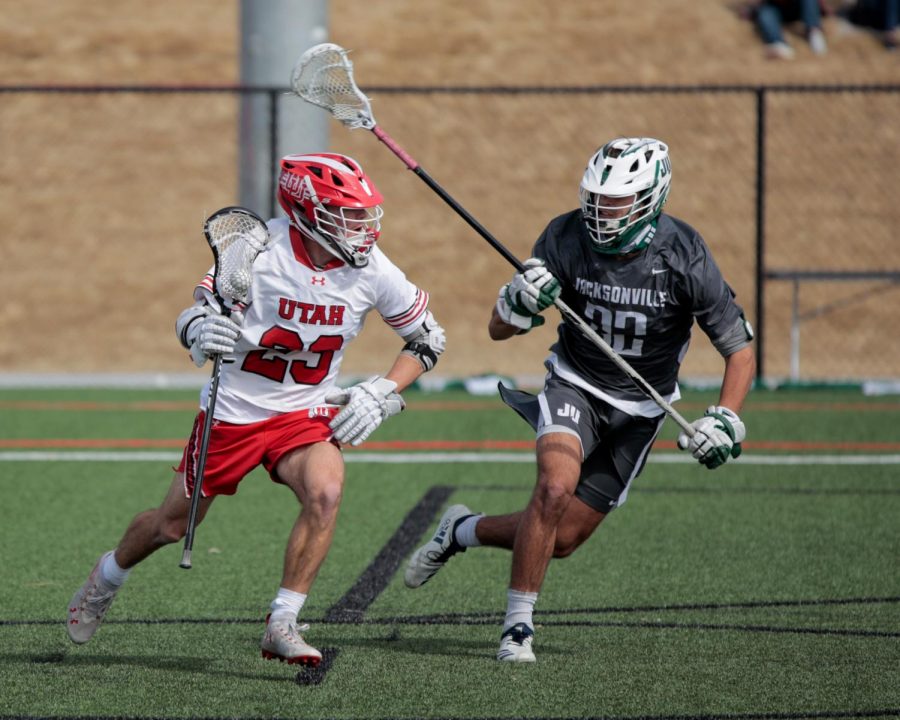Joint Resolution 2 in Support of Black Student Union Passes in Senate, with One Opposed
Laura Seymour and Mina Brown at the welcome desk at the ASUU offices in the Ray A. Olpin Student Union on the University of Utah Campus, Salt Lake City, UT on Thursday, July 13, 2017. (Photo by Adam Fondren | The Daily Utah Chronicle)
July 17, 2020
On Thursday, July 16, the Associated Students of the University of Utah held a senate meeting to discuss Joint Resolution 2: A Resolution in Support of the Black Student Union at the U. After several hours of the debate and questioning, the resolution passed with only one senator opposing.
The resolution outlines specific “whereas” clauses that identify certain reasons for writing the resolution. Some clauses include the murder of George Floyd, lack of scholarships for Black students of various backgrounds, lack of Black faculty and staff and lack of training of professors to handle racial conflicts in their classrooms, among many other reasons.
Then, the resolution lists specific “therefore” clauses that propose plans and changes the U should make in order to support its Black students. Some recommendations included anti-racism and anti-Blackness sessions at New Student Orientation, payment for students who participate in diversity photoshoots for promotional materials for the U and a diversity course requirement to the general curriculum for all students that focuses on the Black experience.
The meeting started off with Matthew Irwin, the organizer and campus events director, saying no racist comments would be allowed and he would do his best to ensure a safe space for all participants.
“There will be absolutely no personal attacks on individuals or groups of people…I want to make it very clear that there will be absolutely no racist comments in today’s meeting. If you are called on and your remarks are insensitive, I will just cut your mic off and you may lose speaking privileges for the rest of the meeting,” Irwin said.
After the opening expectations, the authors of the bill, BSU president Maryan Shale, BSU vice president Elon Darthard, along with co-author ex-officio Devon Cantwell and sponsor Sen. Maeve Wall, introduced the resolution by outlining its main goals and proposals.
“Here are some things the resolution does: It does validate and formally document some concerns and lived experiences of some Black student union members, leaders and alumni, it does recognize some areas for growth, equity and inclusion,” Wall said.
Wall continued on to explain the formal documentation of some Black student experiences within this bill will allow for more transparency in future conversations with administration.
“This is a formal way to say we hear you and support you. This resolution is just a chance for us as senators to acknowledge the lived experiences of some Black students on campus in a more formal and louder way,” Wall said.
Wall pointed out there are no current Black senators within ASUU so this is the optimal platform for BSU to express their voices. She emphasized the need to listen without the intent to respond, especially because the language of the resolution was specifically written by Black individuals whose lived experiences need to be heard.
Because of this intentional language, Wall urged the senators to not attempt to amend the resolution. While no attempt was made to amend the language of the resolution, the questioning period and debate that followed made it clear this resolution would not pass without opposition.
While Darthard was reading a list of questions with corresponding answers which had been prepared in advance, Sen. Seodam Kwak of the College of Sciences motioned to move to the personal questioning period, in the interest of time. His motion was met with debate from those who wished to hear the researched and collectively written responses to the questions sent in from the public.
“I do appreciate going through and seeing some of these answers. I feel like that is important to make an educated decision,” said Sen. Douglas Shumway of the College of Law.
After the authors read the list of answers they had prepared, the meeting moved into public comment, with two individuals voicing their support for the resolution and their request to accept the language without amendments.
The meeting then continued on to the questioning period, where senators can voice their questions and concerns about the resolution.
Sen. Kwak addressed the authors of the resolution and asked which offices and groups they had conversations with when drafting the resolution.
“There are a lot of campus departments that we see on the resolution. While drafting this resolution, how many offices did you actually meet with?” Kwak said.
The authors of the resolution answered by saying their experiences with these offices have shown them they have not been listened to.
“There have been many conversations had with just about all of these offices, dating back to the 2015 town hall meeting. I don’t think this is a new conversation, if anything this is very old in terms of Black students having to consistently talk to administration who have consistently not made changes to the concerns that we as Black students have expressed,” Darthard said.
After the authors of the resolution explained who they had been contacting, Kwak questioned them further.
“I am not hearing any offices, in specific, that you guys have emailed while drafting this legislation,” Kwak said.
Sen. Wall offered to read the list of offices they had been in contact with, but Sen. Kwak said he was speaking only to the authors of the bill.
After Kwak was corrected, as sponsors are allowed to speak during this time, he continued to question the authors of the resolution on their correspondence with other groups during their drafting of the resolution.
“What campus departments have you actually emailed, had conversations with and have actually asked recommendations? I want the answers in specific names and lists,” Kwak said.
Shale proceeded to read the list of offices and leaders they had been in contact with. When Sen. Kwak continued to press the issue, ex-officio Cantwell spoke up.
“I would assume that 5 years of conversations across all of these offices would be sufficient. Additionally, I would also like to point out the fact that I’ve never heard this specific line of questioning for any other type of resolution or bill and I find it highly inappropriate to only be questioning Black student authors when they have given explicitly a list of who they have talked to and consulted on this,” Cantwell said.
The conversation continued on through more questions about the specifics of the resolution. In regards to clauses 21 and 22 which propose to ban hate groups and white supremacist groups from being on campus or gaining financial support from a student, the state or the U, a question was raised.
“How do you distinguish between free speech and hate? Who determines which is which? I need a little more detail on what classifies a group or organization as a hate organization,” said Crystal Lynn Wallenius from the School of Dentistry.
The authors of the bill read the definitions and policies of hate speech by the U.
A motion was then made to exhaust the speaker’s list before moving into the debate, which would allow the few people with questions to speak up before debate began.
Sen. Audrey Stegman described her experience with sororities, including being the president of one in 2019.
“What specific racist practices that you put in there, what are those that you are referring to?” Stegman said.
The authors of the bill explained their experiences with Greek life inspired them to include specific clauses asking Greek life to dismantle their racist practices.
Shale expressed when she went to the Greek life office on campus and asked them how they conduct outreach to students of color, they responded by saying, due to the small population of Black students on campus and in the state in general, it was hard for them to reach out for recruitment.
“The Greek life office is right across the hallway from the center for ethnic student affairs, you see these students of color walking into those offices…I know a lot of people who have rushed and who have dropped because they felt like they were pushed out,” Shale said.
After questions, the meeting moved to debate, where senators and ex-officio members can state their thoughts about the resolution.
“I really support the cause of standing up for Black students here on campus. Yet this resolution has a few things that really concern me. The answer from Greek life, it is clear that they didn’t meet with these departments and failed to establish a specific outline of how to be implemented, and what their exact demands are even at their basic level. I just don’t feel comfortable about considering this bill as is,” Kwak said.
The meeting lasted around four hours, with several members saying this was the most time spent discussing a joint resolution that they could remember. In addition, some senators questioned Kwak’s motives for repeatedly asking questions to the authors, when a few weeks prior, a white student had introduced Joint Resolution 1 and was met with little debate.
“I think there are four questions that all of us should be asking ourselves. One, am I anti-racist? Two, am I willing to listen to and believe Black students? Three, do I want to amplify the unadulterated voices of Black students? Four, do I understand the non-binding nature of a resolution?” said student body president, Ephraim Kum.
Kum later went on to say one cannot both say they support Black students while simultaneously berating them when they do speak up.
Some senators felt tension had been created and explained it made them uncomfortable, and President Kum responded.
“There is tension because there has been a lot of ridiculous treatment of Black students and I hate to say that I am one of them, and so if I sound like I’m pissed off, I am, and I’m not sorry about it,” Kum said.
Others joined Kum in expressing their acknowledgment of the tension and stating it is necessary to listen to the Black voices that are being shared during the meeting.
“I’d like everyone here to take a moment to consider the type of risk that it involved for two unpaid, Black women to come to a body that doesn’t have a single Black senator on it and to ask for you to recognize their humanity, the types of indignities they have experienced here at the U,” Cantwell said.
The authors and sponsors continued to be met with questions and comments targeted at the specific calls to action in the resolution, regardless of the number of times senators and authors reiterated a resolution does not need to have specific action plans.
“I support the cause, just because I am concerned with the demands here, doesn’t mean that I do not support the cause, let’s get that one thing straight… I am genuinely questioning by asking these loose and vague demands, is that bettering our student body?” Kwak said.
Sen. Wall stepped in and labeled what was occurring as racism in action.
“We are seeing the voices of Black women being questioned in ways that don’t happen typically. I have heard the words sound, cohesive and reasonable been used to question the legitimacy of these women’s words and that alone is racism front and center,” Wall said.
Then, the meeting moved into closing remarks, where authors and sponsors of the resolution could share their final thoughts and comments.
“This resolution is personal; this experience is personal… A vote against this legislation will be telling 600 Black students that you don’t care if their hard work isn’t being compensated. A vote against us is an example of another failed system,” Shale said.
Author Darthard also shared her sentiments.
“We as Black students have gotten lost in the word diversity. Our voices, our experiences and our input has been silenced and excluded from conversations had about us, for us, without us,” Darthard said.
The meeting then moved to a vote, with 11 senators in support of the resolution and one — Sen. Kwak — opposed. The resolution will be presented in the ASUU Assembly on July 21.













P. • Sep 4, 2020 at 3:20 pm
To me this sounds like Sen. Kwak was only questioning the vagueness of the resolution. He wanted specifics and the reasons behind them. I am part of the College of Science, which he represents, and I am happy that he wanted evidence and data and specifics. The resolution was too broad to be considered seriously. Those that screamed ‘racism’ should really look up the definition of the word. I can see nothing here that indicates racism in Sen. Kwak’s actions.
John • Sep 3, 2020 at 3:57 pm
Seems this student body has an issue with racism. Calling people racist for questioning a racist document? How ridiculous. These people should be ashamed of themselves.